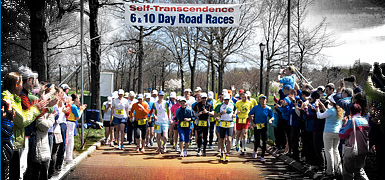Paraplegic climber summits Mount Fuji
Keegan Reilly, 22, who grew up in Soldotna, climbed Japan's highest peak in three days, using a four-wheeled, custom-made mountain bike powered by an arm-driven center crank.
"I'm very, very tired, but I'm overjoyed," Reilly said as he reached the summit. "It's awesome. It took a lot of work, but I feel very privileged to be here." A round of cheers rang across Fuji's rock and ash strewn crater as Reilly reached the top and stopped by a small wooden Japanese shrine, where climbers offer prayers for good luck and prosperity. His eight-member support team then lifted him and his climbing device into the air and spun him around several times to celebrate the success.
A round of cheers rang across Fuji's rock and ash strewn crater as Reilly reached the top and stopped by a small wooden Japanese shrine, where climbers offer prayers for good luck and prosperity. His eight-member support team then lifted him and his climbing device into the air and spun him around several times to celebrate the success.
Reilly reached the 12,385-foot peak a day earlier than expected. He ran into several problems along the way, including a trail ranger who refused to let him pass for eight hours, loose gravel that had his tires spinning much of the way and a broken steering device that needed to be repaired.
"We were ready for an even harder climb," said John Nelson, Reilly's uncle and an experienced mountain climbing guide. "We were prepared for emergencies. We had medical kits, harnesses -- we were very ready for this climb."
Nelson said he hopes Reilly's next summit will be 14,410-foot Mount Rainier in Washington state. They also aim to scale Aconcagua, the tallest peak in South America at 22,835 feet.
Although Reilly was believed to be the first paraplegic to climb Mount Fuji, climbers without the use of their legs have reached such summits as Rainier and Mount McKinley.
"I feel especially privileged to do this as a family," said Levi Reilly, one of three brothers Reilly was climbing with. "We're a very close family, and it's great to be able to do this together."
Keegan Reilly, a student at Oregon State University in Corvallis, said he hoped the climb would serve as an example of what those with disabilities are capable of accomplishing.
"I just wanted to be able to show people what's out there. I wanted to show them what I can do, and I hope some people will be inspired by me," he said.
Reilly turns a crank to propel his arm-powered "Scarab" climbing apparatus, which is made of titanium tubing. The $35,000 machine is designed to roll over boulders and even climb steps.
Since losing the use of his legs in a 1996 car accident, Reilly has climbed Colorado's Mount Elbert at 14,435 feet and California's 14,162-foot Mount Shasta.
He said he chose Mount Fuji, one of the most-climbed mountains in the world, because he wanted to climb a mountain outside the United States.
More than 200,000 people ascend Mount Fuji every year during the July-August climbing season.
By ERIC TALMADGE
The Associated Press
(Published: September 4, 2003)




